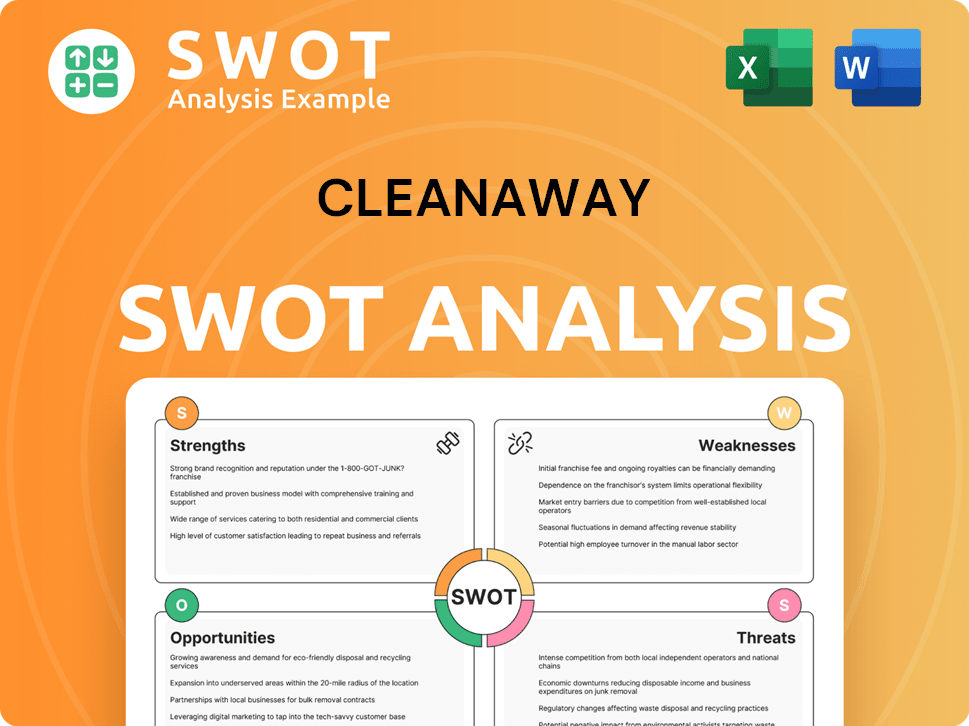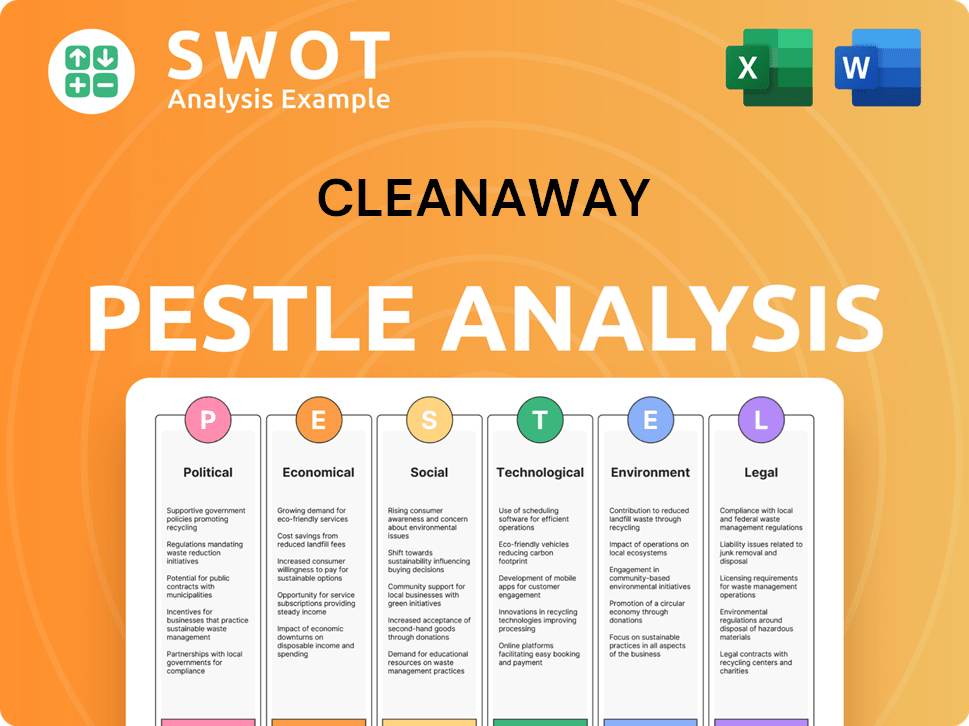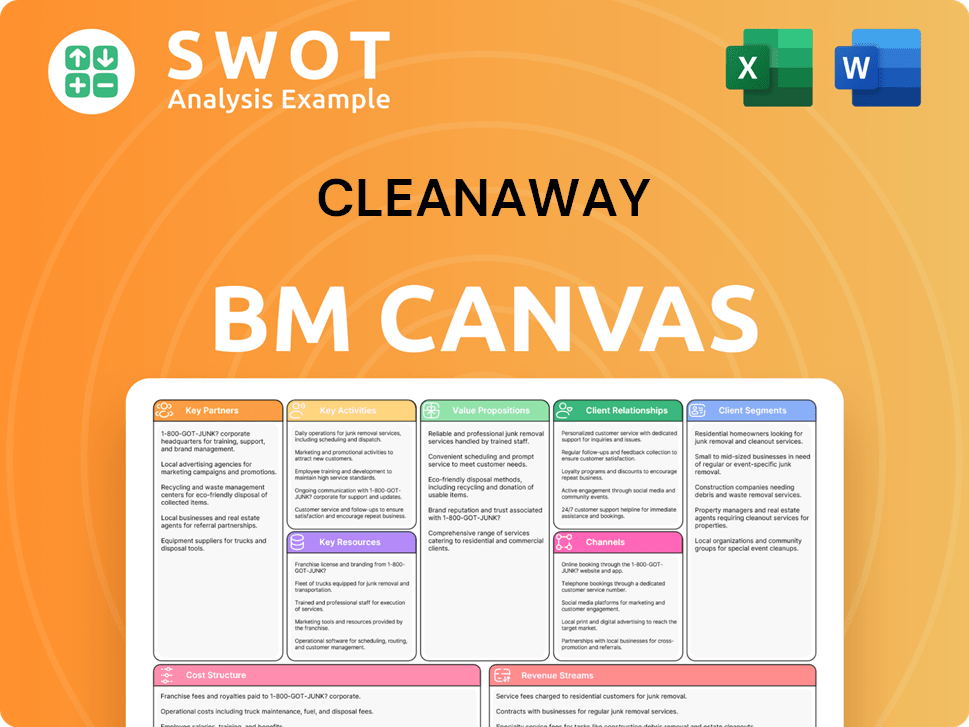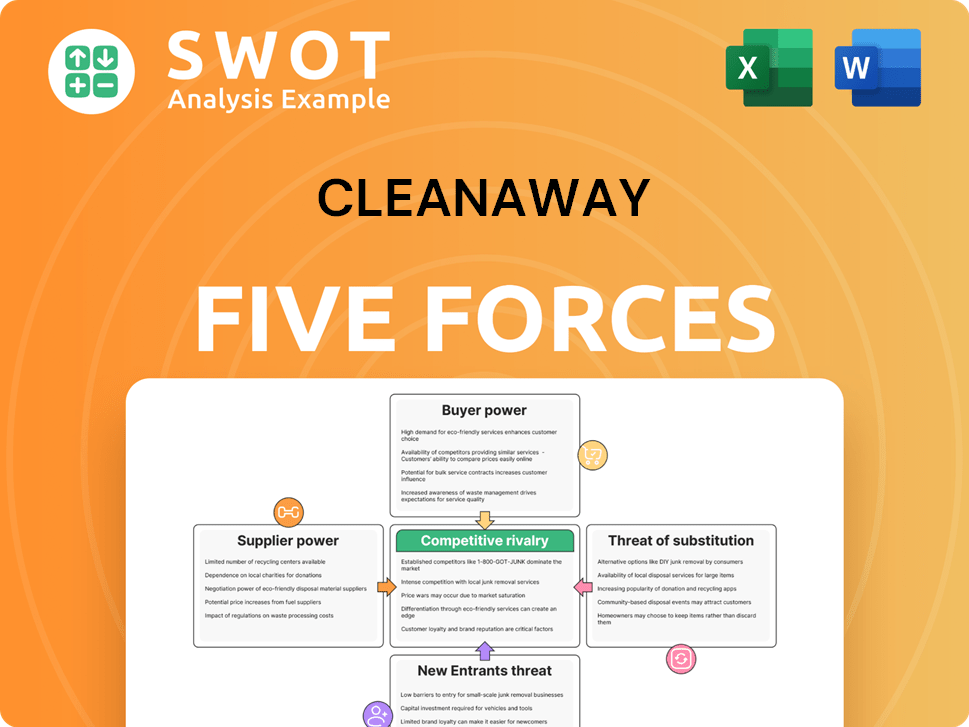Cleanaway Bundle
Who Does Cleanaway Serve?
The waste management sector is transforming, and understanding the Cleanaway SWOT Analysis is crucial. For Cleanaway, a leader in this evolving landscape, knowing its customer demographics and target market is paramount. This knowledge drives everything from service offerings to strategic investments. The shift towards sustainability and resource recovery has fundamentally reshaped the industry, making this analysis more critical than ever.

Cleanaway, founded in 1987, has evolved from basic waste disposal to comprehensive environmental solutions. This shift reflects a significant change in its target audience, demanding advanced recycling and tailored services. This exploration delves into Cleanaway's customer profile analysis, examining who their customers are, their needs, and how the company strategically adapts to serve them. Understanding Cleanaway's target market segmentation is key to appreciating its market share and future growth.
Who Are Cleanaway’s Main Customers?
Understanding the customer demographics and target market is crucial for any company, and for Cleanaway Waste Management Limited, this involves a multifaceted approach. Cleanaway's primary customer segments are largely within the business-to-business (B2B) sector, with a significant emphasis on commercial, industrial, and municipal clients. This focus allows the company to provide comprehensive waste management solutions, including hazardous waste disposal and recycling services.
The company's target audience includes large corporations across various industries such as manufacturing, retail, and healthcare. These clients require robust waste management, regulatory compliance, and sustainable practices. Municipalities also form a key segment, with Cleanaway providing residential waste collection and advanced recycling programs. The company's operations also extend to the business-to-consumer (B2C) segment, serving individual households through municipal contracts.
Cleanaway's strategic direction is influenced by market trends and acquisitions, with a growing emphasis on the circular economy and resource recovery. This shift is driven by evolving regulations and corporate social responsibility. The company's 'Footprint 2025' strategy showcases its commitment to advanced recycling infrastructure and sustainable solutions.
Cleanaway's commercial and industrial clients span manufacturing, retail, and healthcare sectors. These clients require comprehensive waste management, including hazardous waste disposal and recycling. The focus is on regulatory compliance, efficiency, and sustainable practices. In FY23, the Solid Waste Services division showed strong performance, highlighting the importance of these clients.
Municipalities represent a key customer segment for Cleanaway, contracting for residential waste collection and recycling services. These contracts are often long-term and volume-driven, emphasizing cost-effectiveness and environmental responsibility. Cleanaway's services to municipalities include kerbside collection and public litter management.
Cleanaway indirectly serves individual households through municipal contracts. The local council acts as the direct customer, providing waste management services to residents. This B2C engagement is facilitated through the municipal contracts for kerbside collection and recycling.
Cleanaway is adapting to market trends such as the circular economy and resource recovery. This involves increased focus on industrial customers seeking to minimize waste and maximize reuse. The company's 'Footprint 2025' strategy includes investments in advanced recycling infrastructure. For more details, refer to the Revenue Streams & Business Model of Cleanaway.
Cleanaway's ideal customer profile includes businesses and municipalities seeking efficient, compliant, and sustainable waste management solutions. These customers prioritize cost-effectiveness, environmental responsibility, and long-term partnerships.
- Large corporations across various industries
- Municipalities with long-term waste management contracts
- Businesses focused on reducing waste and maximizing resource reuse
- Customers seeking advanced recycling and sustainable solutions
Cleanaway SWOT Analysis
- Complete SWOT Breakdown
- Fully Customizable
- Editable in Excel & Word
- Professional Formatting
- Investor-Ready Format

What Do Cleanaway’s Customers Want?
Understanding the needs and preferences of Cleanaway's customers is crucial for tailoring services and maintaining a competitive edge in the waste management industry. The company's success hinges on its ability to meet the diverse requirements of its commercial, industrial, and municipal clients. This involves a deep dive into the factors that influence their purchasing decisions and ongoing service expectations.
For commercial and industrial clients, key considerations include reliable waste collection, adherence to environmental regulations, and cost-effective solutions. Municipal customers prioritize public health, efficient service delivery, and meeting government recycling targets. Cleanaway's strategies are therefore designed to address these varied needs through customized services and infrastructure investments.
Cleanaway addresses common pain points such as waste segregation complexity and logistical challenges. The company's focus on recycling and energy-from-waste initiatives reflects its response to market trends and customer demand for circular economy solutions. The company's FY23 results highlighted significant progress in its 'Footprint 2025' strategy. This strategy is dedicated to creating a leading network of prized infrastructure assets to support the circular economy. This demonstrates how customer feedback and market trends influence product development. Cleanaway tailors its services by offering customized waste audits, comprehensive waste management plans, and dedicated account management, ensuring that both large corporations and smaller businesses receive solutions aligned with their specific operational and sustainability objectives.
These clients prioritize reliable and efficient waste collection, compliance with environmental regulations, and cost-effective solutions. They often seek long-term contracts and integrated services. Decision-making is influenced by service reliability, competitive pricing, and the ability to handle diverse waste streams.
Municipalities focus on public health and safety, efficient service delivery to residents, and meeting government-mandated recycling targets. Their needs are driven by the requirements of their communities and regulatory obligations.
Many businesses are driven by their own sustainability goals and corporate social responsibility (CSR) initiatives, seeking partners who can help them achieve waste reduction targets and improve their environmental footprint. This is an increasingly important factor.
Customers often prefer integrated solutions covering collection, processing, and reporting. They value transparent reporting on waste diversion and environmental impact. Customized services like waste audits and dedicated account management are also highly valued.
Purchasing behaviors for commercial and industrial customers often involve long-term contracts and detailed service level agreements. This highlights the importance of building strong, lasting relationships with clients.
Cleanaway addresses pain points such as the complexity of waste segregation and logistical challenges. The company's advanced recycling infrastructure and resource recovery facilities directly respond to the unmet needs of customers seeking higher value from their waste streams.
Cleanaway's strategic initiatives directly address customer needs by investing in advanced recycling infrastructure and resource recovery facilities. This allows the company to meet the demands of a changing market and respond to customer feedback. For more details, see the Marketing Strategy of Cleanaway.
- Advanced Recycling Infrastructure: Investments in facilities that enhance waste processing capabilities.
- Resource Recovery: Initiatives focused on extracting value from waste streams, supporting the circular economy.
- Customized Solutions: Tailoring services to meet specific operational and sustainability objectives for various clients.
- 'Footprint 2025' Strategy: A plan dedicated to creating a leading network of prized infrastructure assets to support the circular economy.
Cleanaway PESTLE Analysis
- Covers All 6 PESTLE Categories
- No Research Needed – Save Hours of Work
- Built by Experts, Trusted by Consultants
- Instant Download, Ready to Use
- 100% Editable, Fully Customizable

Where does Cleanaway operate?
The geographical market presence of Cleanaway Waste Management Limited is primarily concentrated in Australia. As a leading waste management provider, Cleanaway's operations span across all states and territories, making it a nationally recognized entity. This extensive reach allows the company to cater to diverse customer needs across various regions.
Cleanaway's operational infrastructure includes a vast network of collection vehicles, transfer stations, recycling facilities, and landfills. This robust infrastructure supports its ability to serve both major metropolitan areas and key regional centers. The company strategically adapts its services to meet the specific needs of each location, considering factors like population density, environmental regulations, and industrial concentrations.
Understanding the nuances of customer demographics and preferences across different regions is crucial for Cleanaway. For example, highly urbanized areas often demand advanced recycling solutions, while regional areas may prioritize efficient general waste disposal. Cleanaway's approach involves tailoring its services, such as collection schedules and waste treatment solutions, to meet these varied requirements.
Cleanaway's operations cover all Australian states and territories, establishing a comprehensive national footprint. This widespread presence allows the company to serve a broad range of customers, from residential clients to large industrial operations. The company's extensive infrastructure supports its ability to manage waste effectively across diverse geographical areas.
Cleanaway tailors its services to meet the specific needs of each region, considering local regulations, community needs, and industrial concentrations. This localized approach includes adapting collection schedules, developing specialized waste treatment solutions, and engaging with local communities. This ensures that Cleanaway can effectively address the unique waste management challenges of each area.
Cleanaway strategically invests in infrastructure, such as new recycling facilities and waste-to-energy plants, to strengthen its presence in key growth markets. These investments are often geographically targeted to address specific regional waste management challenges. For example, the company's pursuit of a new energy-from-waste facility in Western Sydney highlights its expansion efforts.
While precise market share figures for individual cities or regions are not always publicly available, Cleanaway generally holds a strong market position in major metropolitan areas and key regional centers. This strong market presence is a testament to its operational capabilities and strategic focus on customer needs.
Cleanaway's strategic initiatives, such as the development of the Western Sydney Circular Economy Precinct, demonstrate its commitment to expanding its services and meeting the growing demand for sustainable waste management solutions. These efforts are aimed at strengthening its position in key growth markets and addressing specific regional needs. For more information about the company, you can check out the Owners & Shareholders of Cleanaway.
Cleanaway Business Model Canvas
- Complete 9-Block Business Model Canvas
- Effortlessly Communicate Your Business Strategy
- Investor-Ready BMC Format
- 100% Editable and Customizable
- Clear and Structured Layout

How Does Cleanaway Win & Keep Customers?
Customer acquisition and retention strategies are crucial for the success of any waste management company, and the strategies of Cleanaway are no exception. Their approach is multifaceted, combining traditional sales methods with digital marketing and a strong focus on customer service. Understanding the Cleanaway target market and their needs is central to these strategies.
For large commercial and industrial clients, direct sales and relationship management are the primary focus. This involves dedicated account managers who tailor solutions to meet specific waste streams and sustainability goals. Digital marketing also plays a key role in enhancing brand visibility and generating leads. The company uses its online presence to communicate its sustainability initiatives and service offerings.
Retention is driven by reliable service, compliance, and proactive problem-solving. Cleanaway invests in advanced technologies and infrastructure, such as its 'Footprint 2025' strategy, to provide innovative and sustainable solutions. Transparent reporting on waste diversion and environmental performance is also a key factor in maintaining customer relationships, especially as businesses increasingly focus on their own sustainability targets. This approach helps to solidify their Cleanaway customer profile analysis and maintain a strong market position.
Dedicated account managers build strong relationships with clients. They understand specific waste streams and sustainability objectives, offering tailored solutions and long-term contracts. This personalized approach is essential for retaining large commercial and industrial clients.
A professional website, SEO, and targeted online advertising enhance brand visibility. Cleanaway uses its online presence to communicate sustainability initiatives, service offerings, and corporate responsibility. This helps generate inquiries and build brand awareness.
Reliable service delivery and compliance assurance are critical for customer retention. The company invests in advanced technologies and infrastructure. This ensures that waste management services meet all regulatory requirements and client expectations.
Providing transparent reporting on waste diversion and environmental performance is increasingly valued. This helps clients meet their own sustainability targets. Cleanaway’s focus on sustainability aligns with the growing demand for eco-friendly practices.
Cleanaway employs a multi-faceted approach to attract and retain customers. This includes a strong emphasis on direct sales, a robust online presence, and a commitment to sustainable practices. They focus on building long-term relationships and providing excellent service.
- Direct Sales: Dedicated account managers build and maintain relationships with large clients.
- Digital Marketing: A professional website and SEO enhance brand visibility.
- Service Excellence: Reliable service and compliance are critical for customer retention.
- Sustainability Focus: Transparent reporting and sustainable solutions are increasingly important.
The use of customer data and CRM systems is essential for managing client relationships and identifying opportunities for upselling or cross-selling. While specific details on loyalty programs for B2B clients are not widely publicized, the nature of long-term waste management contracts fosters a form of loyalty. Cleanaway's strategic shift towards more integrated and sustainable solutions aims to enhance customer lifetime value by addressing a broader spectrum of client needs. This approach is crucial for understanding Growth Strategy of Cleanaway and adapting to market changes. The company's commitment to innovation and sustainability, as demonstrated by their 'Footprint 2025' strategy, is a key element in their customer acquisition and retention efforts. This strategy supports the company's goals to meet evolving client needs and maintain a competitive edge in the Waste management industry, making a detailed Demographic analysis of the Cleanaway company a valuable asset.
Cleanaway Porter's Five Forces Analysis
- Covers All 5 Competitive Forces in Detail
- Structured for Consultants, Students, and Founders
- 100% Editable in Microsoft Word & Excel
- Instant Digital Download – Use Immediately
- Compatible with Mac & PC – Fully Unlocked

Related Blogs
- What are Mission Vision & Core Values of Cleanaway Company?
- What is Competitive Landscape of Cleanaway Company?
- What is Growth Strategy and Future Prospects of Cleanaway Company?
- How Does Cleanaway Company Work?
- What is Sales and Marketing Strategy of Cleanaway Company?
- What is Brief History of Cleanaway Company?
- Who Owns Cleanaway Company?
Disclaimer
All information, articles, and product details provided on this website are for general informational and educational purposes only. We do not claim any ownership over, nor do we intend to infringe upon, any trademarks, copyrights, logos, brand names, or other intellectual property mentioned or depicted on this site. Such intellectual property remains the property of its respective owners, and any references here are made solely for identification or informational purposes, without implying any affiliation, endorsement, or partnership.
We make no representations or warranties, express or implied, regarding the accuracy, completeness, or suitability of any content or products presented. Nothing on this website should be construed as legal, tax, investment, financial, medical, or other professional advice. In addition, no part of this site—including articles or product references—constitutes a solicitation, recommendation, endorsement, advertisement, or offer to buy or sell any securities, franchises, or other financial instruments, particularly in jurisdictions where such activity would be unlawful.
All content is of a general nature and may not address the specific circumstances of any individual or entity. It is not a substitute for professional advice or services. Any actions you take based on the information provided here are strictly at your own risk. You accept full responsibility for any decisions or outcomes arising from your use of this website and agree to release us from any liability in connection with your use of, or reliance upon, the content or products found herein.